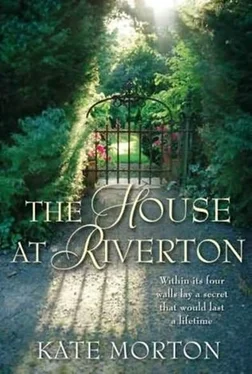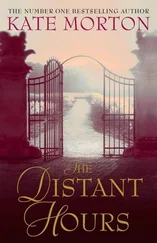Mother brought the tea and sat opposite me. I watched as she poured. There were only two cups. It was to be just the two of us, after all. The room, the flowers, the cushion, were for me.
I took the cup she offered and noted silently the tiny chip on its rim. Mr Hamilton would never approve. There was no place for cracked teacups at Riverton, even in the servants’ hall.
Mother cupped her tea in two hands and I saw that the fingers of each hand had plaited stiffly, one over another. There was no way she’d be able to stitch in that condition; I wondered how long they’d been that bad, how she was affording to live. I had been forwarding her a portion of my own earnings each week, but surely it wasn’t enough. Warily, I broached the subject.
‘That’s none of your business,’ she said. ‘I’m managing.’
‘But Mother, you should have told me. I could have sent you more. I’ve nothing to spend it on.’
Her gaunt face vacillated between defensiveness and defeat. Finally, she sighed. ‘You’re a good girl, Grace. You’re doing your share. Your mother’s bad fortune’s not yours to worry about.’
‘Of course it is, Mother.’
‘You just be sure an’ don’t make the same mistakes.’
I steeled myself, dared to ask gently, ‘What mistakes, Mother?’
She looked away and I waited, heart beating quickly, as she chewed on her dry bottom lip. Wondering whether at last I was to be trusted with the secrets that had sat between us as long as I could remember…
‘Pish,’ she said finally, turning back to face me. And with that the subject’s door was slammed closed. She lifted her chin and asked about the house, the family, as she always did.
What had I expected? A sudden, magnificently uncharacteristic break from habit? An outpouring of past grievances that explained away my mother’s acrimony, enabled us to reach an understanding that had thus far eluded us?
You know, I think perhaps I had. I was young, and that is my only excuse.
But this is a history, not a fiction, thus it will not surprise you that such was not forthcoming. Instead, I swallowed the sour lump of disappointment and told her about the deaths, unable to prevent a guilty note of importance from creeping in as I recounted the family’s recent misfortune. First the Major-Mr Hamilton’s sombre receipt of the black-rimmed telegraph, Jemima’s fingers shaking so that she was unable at first to open it-and then Lord Ashbury, only days after.
She shook her head, slowly, an action that accentuated her long thin neck, and set down her tea. ‘I’d heard as much. I didn’t know how much to put down to gossip. You know as well as I how bad this village is for tittle-tattle.’
I nodded.
‘What was it took Lord Ashbury, then?’ she said.
‘Mr Hamilton said it was a mix. Partly a stroke and partly the heat.’
Mother continued to nod, chewing the inside of her cheek. ‘And what did Mrs Townsend say?’
‘She said it was none of those things. She said it was grief that killed him, plain and simple.’ I lowered my voice, adopting the same reverent tone that Mrs Townsend had used. ‘She said the Major’s death broke His Lordship’s heart. That when the Major was shot, all his father’s hopes and dreams bled with him into the soil of France.’
Mother smiled, but it was not a happy gesture. She shook her head slowly, looked at the wall before her with its pictures of the distant sea. ‘Poor, poor Frederick,’ she said. This surprised me and at first I thought I must have misheard, or that she had made a mistake, uttered the wrong name accidentally, for it made little sense. Poor Lord Ashbury. Poor Lady Violet. Poor Jemima. But Frederick?
‘You needn’t worry about him,’ I said. ‘He’s as like to inherit the house.’
‘There’s more to happiness than riches, girl.’
I didn’t like it when Mother spoke of happiness. The sentiment was hollowed by its speaker. Mother, with her pinched eyes and her empty house was the last person fit to offer such advice. I felt chastened somehow. Reprimanded for an offence I couldn’t name. I answered sulkily. ‘Try telling that to Fanny.’
Mother frowned, and I realised the name was unknown to her.
‘Oh,’ I said, inexplicably cheered. ‘I forgot. You wouldn’t know her. She’s Lady Clementine’s charge. She hopes to marry Mr Frederick.’
Mother looked at me, disbelieving. ‘Marry? Frederick?’
I nodded. ‘Fanny’s been working on him all year.’
‘He’s not asked her, though?’
‘No,’ I said. ‘But it’s only a matter of time.’
‘Who told you so? Mrs Townsend?’
I shook my head. ‘Myra.’
Mother recovered somewhat, managed a thin smile. ‘She’s mistaken then, this Myra of yours. Frederick wouldn’t marry again. Not after Penelope.’
‘Myra doesn’t make mistakes.’
Mother crossed her arms. ‘On this, she’s wrong.’
Her certainty grated me, as if she would know better than I the goings on up at the house. ‘Even Mrs Townsend agrees,’ I said. ‘She says Lady Violet approves the match and that, though Mr Frederick mightn’t appear to mind what his mother says, he’s never gone against her when it counted.’
‘No,’ said Mother, her smile flickering then fading. ‘No, I don’t suppose he has.’ She turned to stare through the open window. The grey-stone wall of the house next door. ‘I never thought he would remarry.’
Her voice had lost all resolution and I felt badly. Ashamed of my desire to put her in her place. Mother had been fond of this Penelope, of Hannah and Emmeline’s mother. She must’ve been. What else explained her reluctance to see Mr Frederick replace his late wife? Her dejection when I insisted it was true? I put my hand on hers. ‘You’re right, Mother. I was speaking out of turn. We don’t know anything for sure.’
She didn’t answer.
I leaned close. ‘And certainly there’s none could accuse Mr Frederick of genuine feeling for Fanny. He looks more lovingly at his riding crop.’
My joke was an attempt to cajole her, and I was pleased when she turned to face me. I was surprised, too, for in that moment, as the afternoon sunlight brushed her cheek and teased green from her brown eyes, Mother almost looked pretty. It was a term I’d never thought would suit her. Clean and neat, perhaps, but never pretty.
I thought of Hannah’s words, her talk of Mother’s photograph, and I was even more resolved to see it for myself. To glimpse the type of person Mother might have been. The girl Hannah called pretty and Mrs Townsend remembered so fondly.
‘He was always a great one for riding,’ she said, setting her teacup on the window ledge. She surprised me then, took my hand between hers and rubbed at the chapped patches on my palm. ‘Tell me about your new duties. Looks of these, they’ve been keeping you awful busy up there.’
‘It’s not so bad,’ I said, moved by her rare affection. ‘There’s not much to recommend the cleaning and the laundering, but there’s other duties I don’t mind so much.’
‘Oh?’ She inclined her head.
‘Myra’s been so busy at the station that I’ve been doing a lot more of the upstairs work.’
‘You like that do you, my girl?’ Her voice was quiet. ‘Being upstairs in the grand house?’
I nodded.
‘And what do you like about it?’
Being amongst fine rooms with delicate porcelains and paintings and tapestries. Listening to Hannah and Emmeline joke and tease and dream. I remembered Mother’s earlier sentiment and suddenly knew a way to please her. ‘It makes me happy,’ I said. And I confessed something then that I hadn’t even owned myself. ‘One day I hope to become a proper lady’s maid.’
She looked at me, the tremors of a frown plucking at her brow. ‘There’s future enough as a lady’s maid, my girl,’ she said, voice strained thin. ‘But happiness… happiness grows at our own firesides,’ she said. ‘It is not to be picked in strangers’ gardens.’
Читать дальше












